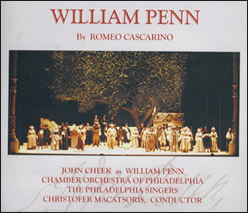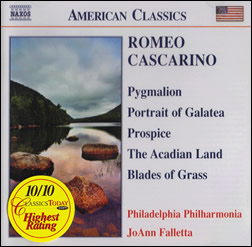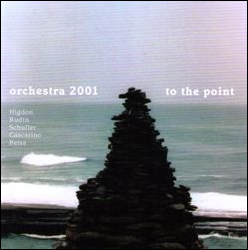| |
William Penn Opera
Henry Fogel, Fanfare: “…cohesive music drama, with memorable tunes and a sense of shape and inevitability…genuine melodic inspiration and a rich sense of orchestral color……underlies the psychology of the drama throughout…my mind didn’t wander at all throughout three listening…”
Robert Baxter, Courier-Post: “…great dramatic sweep…soaring melody and epic choral scenes…finely crafted and beautifully scored…wealth of glowing melodies…a commanding mastery of the idiom…”
Michael Caruso, Main Line Times: “…definitely a contemporary masterpiece...able to uncover the inner personalities of the characters…”
John Davison, Composer: “…beautiful and expressive throughout…skill is enormous, but unobtrusive…immensely satisfying lyric-dramatic flow…a seamless web of sound…uplifting, an inspiratory effect…” |

|
| |
|
|
|
| |
Orchestral Music of Romeo Cascarino, JoAnn Falletta, Conductor, (Naxos)
Reviewed by Eric J. Brushin, Fanfare. “The music on this CD is beautiful from beginning to end some of it exceptionally so. “…clarity, wit and unabashed lyricism…found myself listening to it two or three times in one sitting.” “Why any conductor who saw this appealing, lively, vividly drawn and wonderfully scored music would not want to perform it is beyond me.” Pygmalion: “pick of the litter…rich harmony, tidy orchestration and stateliness…” Prospice: “…appropriately inspirational”. Acadian Land: “… the other high point of this CD. It holds up well after many playings”. “The CD makes me want to hear more of Cascarino’s music”. “It remains only to praise enterprising conductor JoAnn Falletta for shaping immaculate performances.”
American Classics, INDEED! July 15, 2012
By Timothy McDonnell
Romeo Cascarino's orchestral works represent a lost world of American music. While many composers were toiling in the pedantic academic style that absorbed so much of the 20th Century, Cascarino spent a career writing music that served only his compulsion to give breath to his uniquely American voice. The notion of American lyricism is largely associated with composers like Barber, Menotti, and Copland, but this album ably demonstrates that Cascarino achieves a wealth of melodic invention, contrapuntal craftsmanship, and harmonic depth that makes much of their output seem facile. It goes without saying that Cascarino's oeuvre has been long overlooked, and this album is testimony to a charm and eloquence that not only should endure, but flourish.
Glorious Music!
September 13, 2013 By E. Thomas (Blue Bell, PA)
"I have long been an admirer of Romeo Cascarino's work. But this past week I was reminded again, when Blades of Grass was aired on WRTI, that we are hardly ever treated to his music. The lushness and beauty and intelligence with which Cascarino constructs his orchestral works penetrate deep into the soul. Much of it is haunting - and all of it is beautiful. This overlooked artist's music should be given much more attention. Here's hoping Yanik Nezet-Seguin will see fit to organize a resurrection as soon as possible!"
Rapturous Music - Cascarino is a genius
January 14, 2013 By James Gall See
"The most moving and deep music to enrapture my living soul. Where is the rest of his [music?] Forget Copeland, Barber, etc. this man is one of the greatest composers ever to walk on our planet. Controlled and binding, this album moved me like only Rachmaninoff and Frank Bridge (British Composer) can. Sensational music composition."
|

|
| |
|
| |
Various Reviews of Romeo Cascarino's Blades of Grass, James Freeman Conductor, (Innova)
“… the piece is a breath of fresh air and a break from what may feel like more cerebral music. Cascarino’s piece is simply beautiful and his sound is unique…”
“Blades of Grass is a minor masterpiece for English horn and orchestra... American music lovers would be advised to track down this CD for this work alone, even with the strength of the pieces that it is surrounded by here…”
“Orchestra 2001 accompany with due reverence for music whose melancholy wistfulness and fragile beauty lingers long after the final note."
“…heart-rending poignancy of what is, in effect, an extended lament… Dorothy Freeman…is a hauntingly eloquent advocate for the piece."
“Perhaps the most gratifying reaction is how well Romeo Cascarino’s Blades of Grass, a short cor anglais concerto far too lyrical and emotionally direct to find much support in the modernist musical climate of its day, fits with these newer pieces." |

|
| |
|
|
|
| |
|
Blades of Grass
“…has given us a minor masterpiece of mood music with a remarkable lyric quality.”
-Sunday Independent, Wilkes Barre, Pa.
Romeo Cascarino was a self-taught composer who taught composition and theory at the Combs College of Music. His Blades of Grass (1945) was composed after the composer’s tour of duty in the army after his hearing Carl Sandburg’s poem “ Grass”. Heard in the midst of these other contemporary works, the piece is a breath of fresh air and a break from what may feel like more cerebral music. Cascarino’s piece is simply beautiful and his sound is unique. It might be easy to lump the work in line with Copland’s mid-1940s style, but the piece’s sheer beauty and sweep comes from a Romantic tradition. Decidedly one of the composer’s most performed pieces deserving more recorded visibility, Blades of Grass is a minor masterpiece for English horn and orchestra and Dorothy Freeman’s performance is moving. American music lovers would be advised to track down this CD for this work alone, even with the strength of the pieces that it is surrounded by here. -Cinemusical, Maestro Steve.
Dating from 1945, Romeo Cascarino’s Blades of Grass is the oldest work in the program and the only one not to be recorded live in concert. To know that it was written while the composer was serving in the American army and inspired by the double Pulitzer Prize-winning Carl Sandburg’s poem Grass, an ironic meditation on combatants who have suffered death through centuries of war – “Pile the bodies high at Austerlitz and Waterloo … And pile them high at Gettysburg / And pile them high at Ypres and Verdun” – is enough to appreciate the heart-rending poignancy of what is, in effect, an extended lament. Dorothy Freeman, whose performance of the piece in concert in 1994 prompted Cascarino to note on her score that she had “played the part better than anyone,” is a hauntingly eloquent advocate for the piece. Orchestra 2001 accompany with due reverence for music whose melancholy wistfulness and fragile beauty lingers long after the final note. It leaves one wishing that Cascarino had found something in Thoreau or Walt Whitman worthy of setting. -Classical Review, Michael Quinn.
“Blades of Grass” by Romeo Cascarino presents a very different mood to the other works in this collection. Cascarino was a native Philadelphian and, for many years, a theory and composition teacher at the Combs College of Music. This brief, poignant and moving elegy for English and orchestra takes its title from the equally moving poem, “Grass”, by Carl Sandburg. The poem is a breathtaking reflection on the finality of death through war and the passage of time. This piece is also the oldest on the program, having been written in 1945, just at the close of World War II. I have always found English horn to have a very moving, beautiful, reflective timbre. This piece and its tone reminded me of the famous solo part from Copland’s “Quiet City”. It really caught my attention and the feel of the piece is made more sensitive through reading Sandburg’s text but also in reading the commentary by conductor James Freeman who points out that his phone call to Cascarino to tell him of this recording was met with the news from the composer’s wife that Romeo Cascarino had just passed away the day before that phone call. Incredible. Soloist Dorothy Freeman plays the solo part beautifully and with strong emotion. -Daniel Coombs
“Perhaps the most gratifying reaction is how well Romeo Cascarino’s Blades of Grass, a short cor anglais concerto far too lyrical and emotionally direct to find much support in the modernist musical climate of its day, fits with these newer pieces.” -Gramophone, Ken Smith, Sept. 2011. |
| |
|
| |
|
Sonata for Bassoon and Piano
“It is a very expressive work and even in the outer movements which are of a brilliant,
gay character, there are sections of long, lovely melodies for which Cascarino has a
particular gift. This is brought out most clearly in the languid slow movement which
has a very American quality…” -Coronet Records
“…a deftly written and enjoyable three-movement sonata…Decidedly one of the
evening’s most appealing and melodious contributions.” -William E. Smith, Philadelphia Bulletin.
“…a successful spoof and is brightly played by the composer at the piano with Sol
Schoenbach, bassoonist.” New York Times
“…a finished performer of his own music. Cascarino, if he ever decides to cease
composing, could do very well as a pianist.” Clark Larrabee, Philadelphia Inquirer
|
| |
|
| |
|
Recollections of My Boyhood
“…short, tuneful, well-constructed and neatly orchestrated. It was a pleasure to hear a contemporary composer write music reaffirming the viability of the diatonic scale”.
Harry Trebilcox, Sunday Independent, Wilkes Barre, Pa. |
| |
|
| |
|
|
|
|
| |
|
| |
|
| |
|
| |
|
| |
|
|
|

